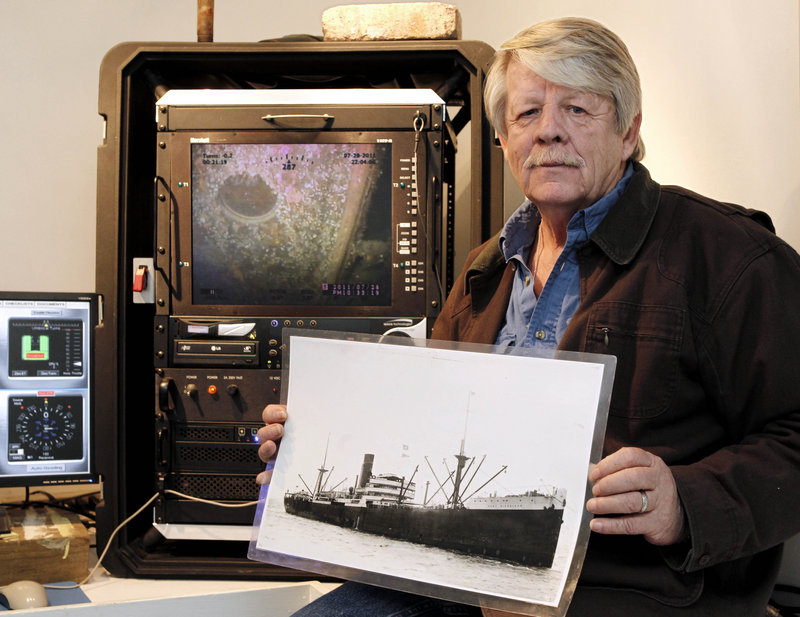A federal lawsuit against a treasure hunter from Gorham by a contractor hired to help salvage a World War II-era shipwreck off Cape Cod has been settled.
Terms and conditions of the settlement, which was finalized this month, were not disclosed, under an agreement between the two parties, Sub Sea Research, owned by Greg Brooks, and Deep Down Inc., of Houston, Texas.
Two other legal cases involving Brooks – a claim challenging his rights to the shipwreck and an investigation by the Maine Office of Securities for possible investor fraud – are still active.
The lawsuit, filed last year, had been scheduled for trial in October, and attorneys for both Sub Sea and Deep Down filed final pretrial memos in late August.
Attorneys for Sub Sea and Deep Down declined to comment on the settlement, but court documents provide insight into the dispute.
Deep Down alleged that it entered into a salvage agreement contract with Sub Sea in September 2012 to help search the wreckage of the SS Port Nicholson, a British cargo vessel that sank during World War II.
Brooks, whose company was awarded salvage rights in 2008, believes there is $3 billion in treasure aboard the wreck, although others dispute that claim.
Deep Down was hired to provide a remotely operated vehicle that would dive 700 feet, penetrate the hull of the shipwreck, and bring up any cargo or at least document what was there.
The company indicated in court documents that it had extensive experience in water much deeper than 700 feet and that its equipment was top-notch.
Deep Down claimed that it “diligently attempted to penetrate the hull of the Port Nicholson,” and even though unsuccessful, met the terms of the contract.
“To the extent that (Deep Down) did not complete all of the tasks outlined in the contract, it was prevented from doing do by Sub Sea’s breach of contract,” the pretrial memo said, explaining that Sub Sea did not properly anchor or hold the salvage vessel over the wreck site.
“Sub Sea’s captain, Gary Esper, was incompetent and could not maintain the Sea Hunter’s position,” wrote Deep Down’s attorney, Cathy Roberts. “Sub Sea lost position repeatedly throughout the course of this project, making it impossible for (Deep Down) to complete its plan.”
Deep Down sought payments totaling $133,925.
Sub Sea Research, through its attorneys, disputed the claims made by Deep Down and filed a counterclaim alleging that it was Deep Down which breached the contract.
“All payments due to (Deep Down) by (Sub Sea) were contingent on (Sub Sea’s) inspection and acceptance of the work performed by (Deep Down) to confirm that it met the requirements of the salvage agreement,” wrote Sub Sea’s attorney, Ilse Teeters-Trumpy. “Simply put, payment was contingent on performance and the accomplishment of certain objectives, not on hours spent trying.”
Sub Sea said that it paid $55,000 to Deep Down, but its counterclaim indicated that the company was overpaid.
The salvage of the Port Nicholson, now into its sixth year, has been mostly a failure from the start.
Brooks and his crew have not retrieved anything of value from the wreck, and its status report, required by the courts, has pinned blame on weather conditions and equipment failures.
Also, even though the Deep Down case has been settled, Brooks and Sub Sea still have other legal hurdles in front of them.
One group of investors, led by Daniel Stochel of New York, has filed an intervening claim against Brooks related to the salvage.
Stochel and his partners, doing business as Mission Recovery, have petitioned the court to strip salvage rights from Brooks and give them to Mission Recovery.
The Secretary of State for Transport of the United Kingdom also has intervened in the Port Nicholson salvage because the ship is of British origin. That case is pending.
Finally, the Maine Office of Securities this year took the unusual step of soliciting information from anyone who invested with Brooks or his associated companies and anyone he approached about investing. The investigation by the Office of Securities, which exists in part to protect Maine investors from fraudulent practices, is ongoing.
In the Deep Down case, a former crew member of Sub Sea testified that Brooks and others intentionally misled investors – even going so far as to buy a fake gold bar on the Internet, plant it at the bottom of the ocean, and film its retrieval in an attempt to lure investments.
Send questions/comments to the editors.




Success. Please wait for the page to reload. If the page does not reload within 5 seconds, please refresh the page.
Enter your email and password to access comments.
Hi, to comment on stories you must . This profile is in addition to your subscription and website login.
Already have a commenting profile? .
Invalid username/password.
Please check your email to confirm and complete your registration.
Only subscribers are eligible to post comments. Please subscribe or login first for digital access. Here’s why.
Use the form below to reset your password. When you've submitted your account email, we will send an email with a reset code.